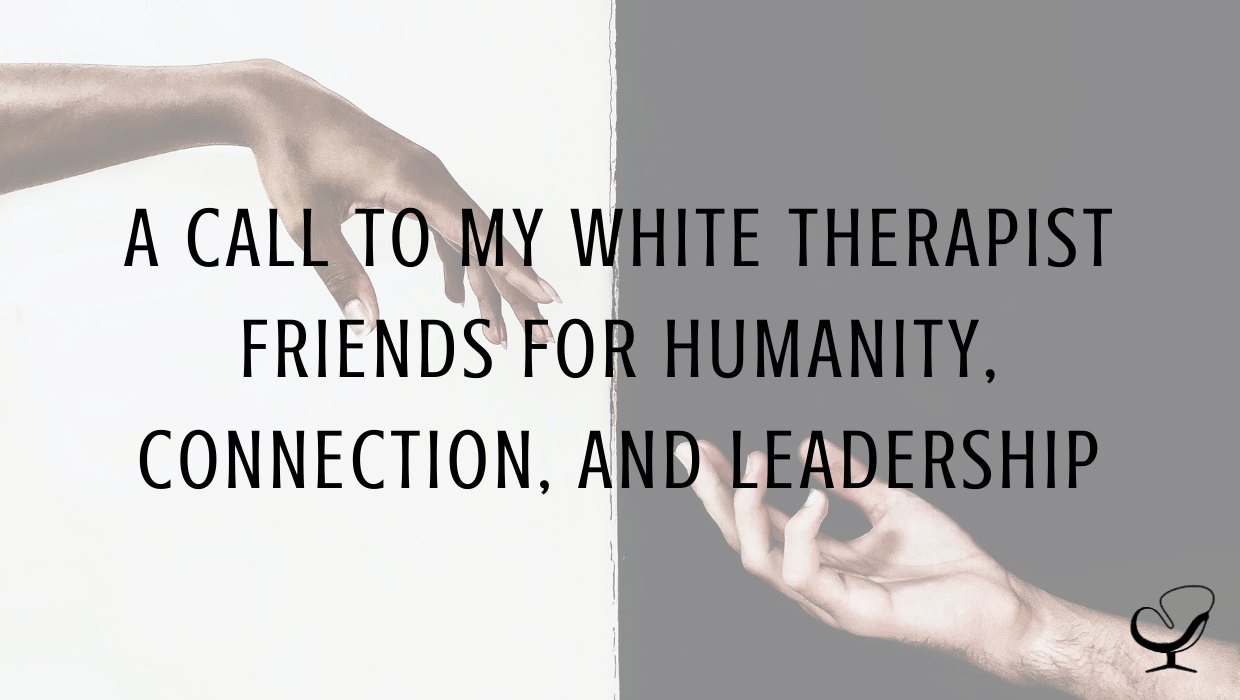Our nation is enduring a double pandemic. We went from a global health pandemic, COVID-19 to a racial pandemic which is taking a toll on the psychological well-being of those we serve, particularly our black clients. As therapists, we know all too well the damaging effects of enduring one significant crisis after another can have on our nervous system.
The root of our current national crisis is simple. Our nation, for far too long, has deemed Black people as a threat at best, and at worst less than human.
As a result of a recent string of violent events that reflect this disregard for Black humanity, my clients are exhibiting all the familiar signs of trauma: anxiety, hypervigilance, anger, nightmares, numbness. All of my clients… of all races. The condition of my black clients, in particular, is one of mourning.
As a Black therapist carrying a diverse caseload (50% of my clients are Black and the other 50% are White), I have observed this week that the majority of my clients from both races displayed a myriad of emotions. From depression and intense anxiety to exhaustion and silence. But virtually no mention at all of the fires that I knew were burning right outside of their neighborhoods. In some cases, quite literally.
What I quickly discovered was that similar to what occurs in the attachment bond formed through non-verbal communication with a child looking toward a caregiver for safety and connection, my clients looked toward me for security, and leadership. So, I took the lead. While the killing of Mr. George Floyd and a countless number of other unarmed Black men and women has deeply impacted me as a Black mom, married to a Black man, raising two young Black sons, I chose to be a leader for my clients. So, I broached the subject, once allowing a tear to escape and roll down my face, while I maintained the therapeutic space with presence and compassion
My awareness has recently been heightened around a multitude of things. I am a member of a statewide listserv for therapists and I was surprised by the deafening silence of my White colleagues this week who are otherwise quite vocal about many other hot button issues. At one point, I found myself reacting with anger to the silence of my White colleagues, many of whom I greatly respect. How dare they not speak up at a time like this! Then the fog cleared…and my years of trauma training kicked in again as I realized, oh yes, they too may be scared, or overwhelmed, or uncertain about what to say or do.
But then a few Black therapists posted, acknowledging what was happening in the world and my frustration grew.
While we understand that apathy and avoidance can be normal reactions to extreme stress or trauma, the problem is that silence then becomes a barrier to connection. When White colleagues and friends choose silence, the message that Black people receive is “My humanity doesn’t matter to you either.”
What our Black clients and colleagues need now, more than ever, is genuine connection and support.
The research about what helps most following a traumatic event is clear. Support from friends and significant others is a powerful determinant of the long-term effects of trauma and is known to reduce the intensity of PTSD symptoms.
Support is paramount. However, in this moment, what it means to be supportive can no longer include passive gestures that lead nowhere. Beyond the hashtags and blacked out social media boxes, I challenge my fellow White therapist to dig deep and lean in. Yes, there will be missteps, interactions will be uncomfortable, even awkward at times, but continue to engage.
Leadership is needed now more than ever—but perhaps in more imaginative ways. We, therapists, are gifted at creating and holding space for hurting hearts, but our gifts may need to go beyond the therapy room. Whatever position of privilege you hold, leverage it. Please speak up. Learn and unlearn. Join a protest or fund the cause. Find creative ways to demonstrate solidarity with fellow Black therapists who are holding space for so many traumatized Black clients– and feeling overloaded as they manage their own traumatic stress.
And fellow healers, can we get back to the heart? Can we finally strip away religious, racial, political, and cultural divides and get back to our heart? Can we agree that the protests are not partisan—they are American? Can we push past the fear of misstepping and lead in a heart-minded way? Can we use our humanity to connect with the humanity of others?
Can we say, “Black Lives Matter” and mean it?
I am grateful for the numerous White therapist friends who have since reached out to me both publicly and privately expressing their deep sadness. Now more than ever, our nation needs more allies. However, true allyship requires grit. And a willingness to be uncomfortable.
We each will have our own process for growing closer to heart-centeredness as it relates to blind spots and racial injustice. May the work of Black leaders and long-time Non-Black allies inspire you to find your own path.
Finally, this will be a long road. Take a breath, take a walk, take a nap. But, fellow healer, get back to the work. Our nation is depending on it.
This post originally appeared here.
 Chinwé Williams, PhD, is an EMDR trained, Licensed Professional Counselor (LPC), Board Certified Counselor, and a Certified Professional Counselor Supervisor (CPCS). She earned a master’s degree in Counseling from the University of Georgia and a doctorate in Counselor Education from Georgia State University.
Chinwé Williams, PhD, is an EMDR trained, Licensed Professional Counselor (LPC), Board Certified Counselor, and a Certified Professional Counselor Supervisor (CPCS). She earned a master’s degree in Counseling from the University of Georgia and a doctorate in Counselor Education from Georgia State University.
Her 19 years of professional experience include work in school systems, community mental health, hospitals, and university settings working with a range of trauma survivors, including combat veterans and clients who have been physically and sexually assaulted in childhood and adulthood. Clinical specialties include trauma resolution, adolescent and young adult concerns, and women’s wellness. She is the owner of Meaningful Solutions Counseling & Consulting and Co-founder of Southeastern Counselor Training Institute (SCTI).

